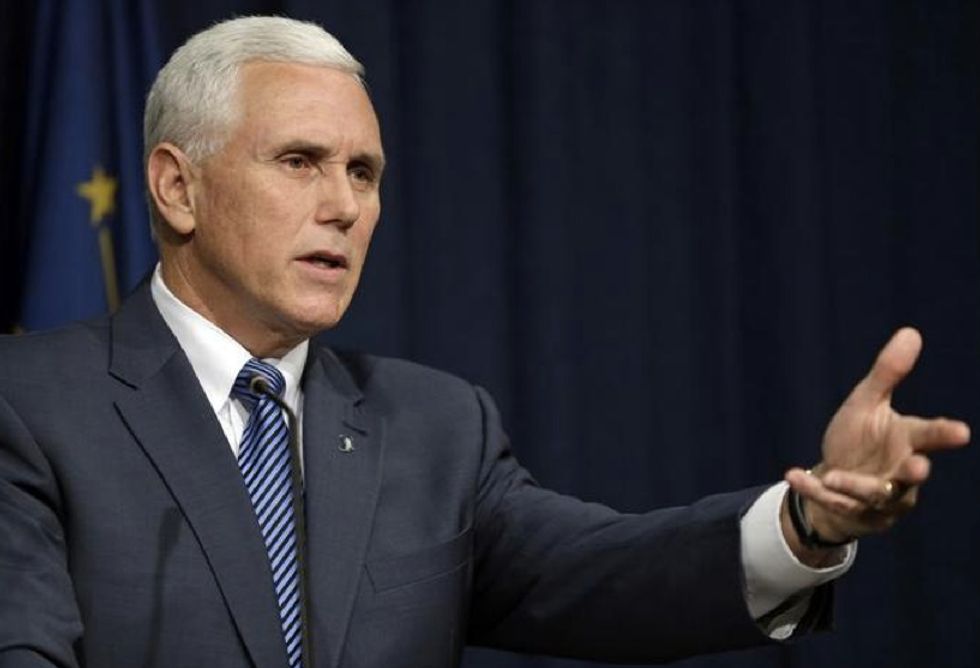
Indiana Gov. Mike Pence holds a news conference at the Statehouse in Indianapolis, March 26, 2015. (AP Photo/Michael Conroy)

INDIANAPOLIS (TheBlaze/AP) — Indiana Gov. Mike Pence signed the Religious Freedom Restoration Act into law during a private ceremony on Thursday, praising the legislation as an opportunity to support religious conscience for "every Hoosier of every faith."
"The Constitution of the United States and the Indiana Constitution both provide strong recognition of the freedom of religion but today, many people of faith feel their religious liberty is under attack by government action," Pence said in a statement.
While some convention organizers and business leaders had opposed the proposal amid concern it could allow discrimination against gay people, Pence cited faith-based battles over the Affordable Care Act as his reasoning for signing the bill.

Indiana is the first state to enact such a change this year among about a dozen where such proposals have been introduced. The measure would prohibit state and local laws that "substantially burden" the ability of people — including businesses and associations — to follow their religious beliefs.
Pence, a Republican, backed the bill as it moved through the Legislature and spoke at a Statehouse rally last month that drew hundreds of supporters of the proposal.
In his statement, the governor seemingly attempted to temper any fears that the religious freedom bill was rooted in bias.
"This bill is not about discrimination, and if I thought it legalized discrimination in any way in Indiana, I would have vetoed it," Pence said. "In fact, it does not even apply to disputes between private parties unless government action is involved."
But some critics have voiced major concerns.
In a letter to Pence sent Wednesday, leaders of the Christian Church (Disciples of Christ) warned that the legislation was causing them to reconsider plans to hold their 6,000-person General Assembly in Indianapolis in 2017.
And Adrian Swartout, the CEO of the 50,000-person Gen Con gamers' convention, said the legislation could affect the group's decision to hold the major event in Indianapolis past 2020. He said it would have "a direct negative impact on the state's economy."
Supporters say discrimination concerns are overblown because the bill is modeled after a federal religious freedom law Congress passed in 1993 and similar laws are on the books in 19 states. However, the current political climate is far different than it was when most of those were approved because the U.S. Supreme Court is expected to rule this year on whether gay marriage bans violate the Constitution.
Conservative groups say the Indiana measure merely seeks to prevent the government from compelling people to provide such things as catering or photography for same-sex weddings or other activities they find objectionable on religious grounds.
"I think you will find that, if you do your homework in it, this law is not going to allow you to discriminate against anyone else or anyone's rights in this country," GOP Indiana Senate President Pro Tem David Long said.
But the Republican mayor of Indianapolis said he believed the proposal would send the "wrong signal" for the city, and its tourism and convention agency raised concerns that it could lead some convention planners to regard Indiana as an unwelcoming place.
The Indianapolis chamber of commerce and Columbus-based engine maker Cummins Inc. are among business groups which have opposed the bill on the grounds that it could make it more difficult to attract top companies and employees.
Similar bills have been advancing this year in the Arkansas and Georgia legislatures. Last year, Mississippi enacted a religious objection law just weeks after Arizona Gov. Jan Brewer, a Republican, vetoed a similar effort there amid criticism from major corporations.
Billy Hallowell